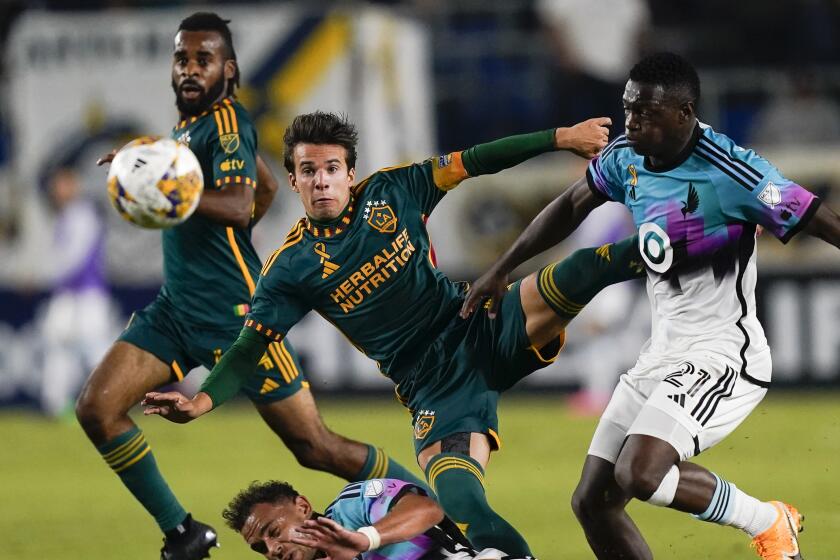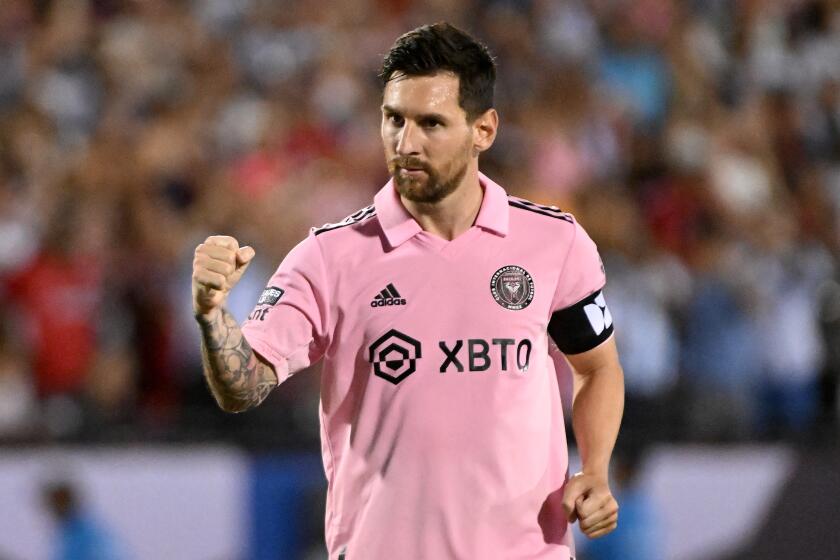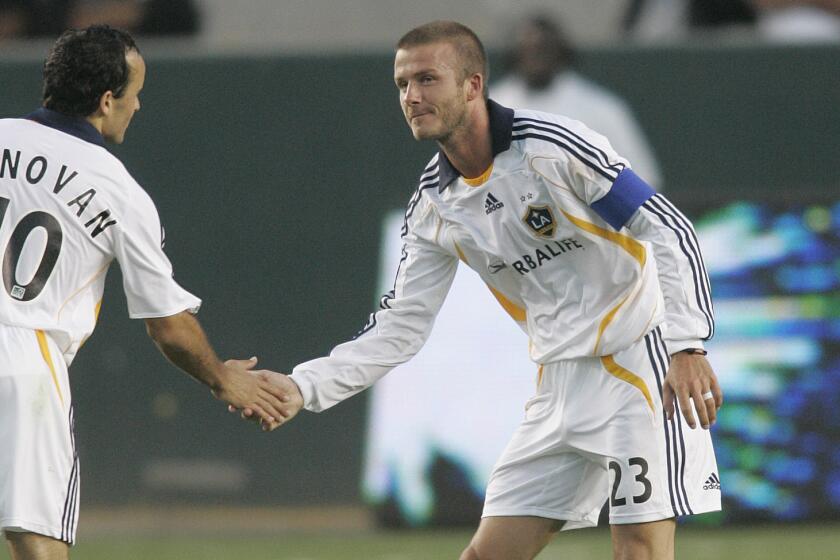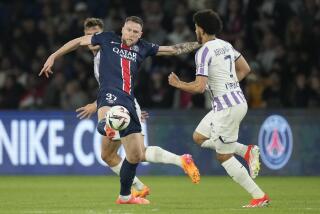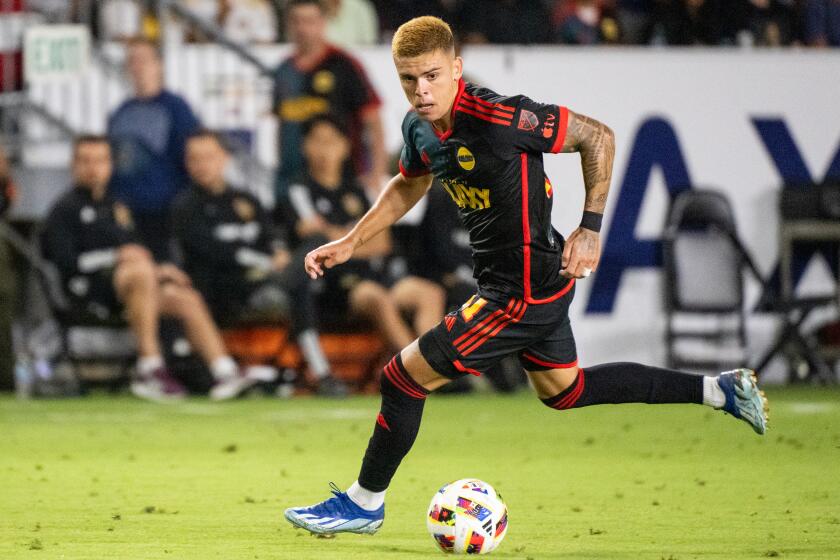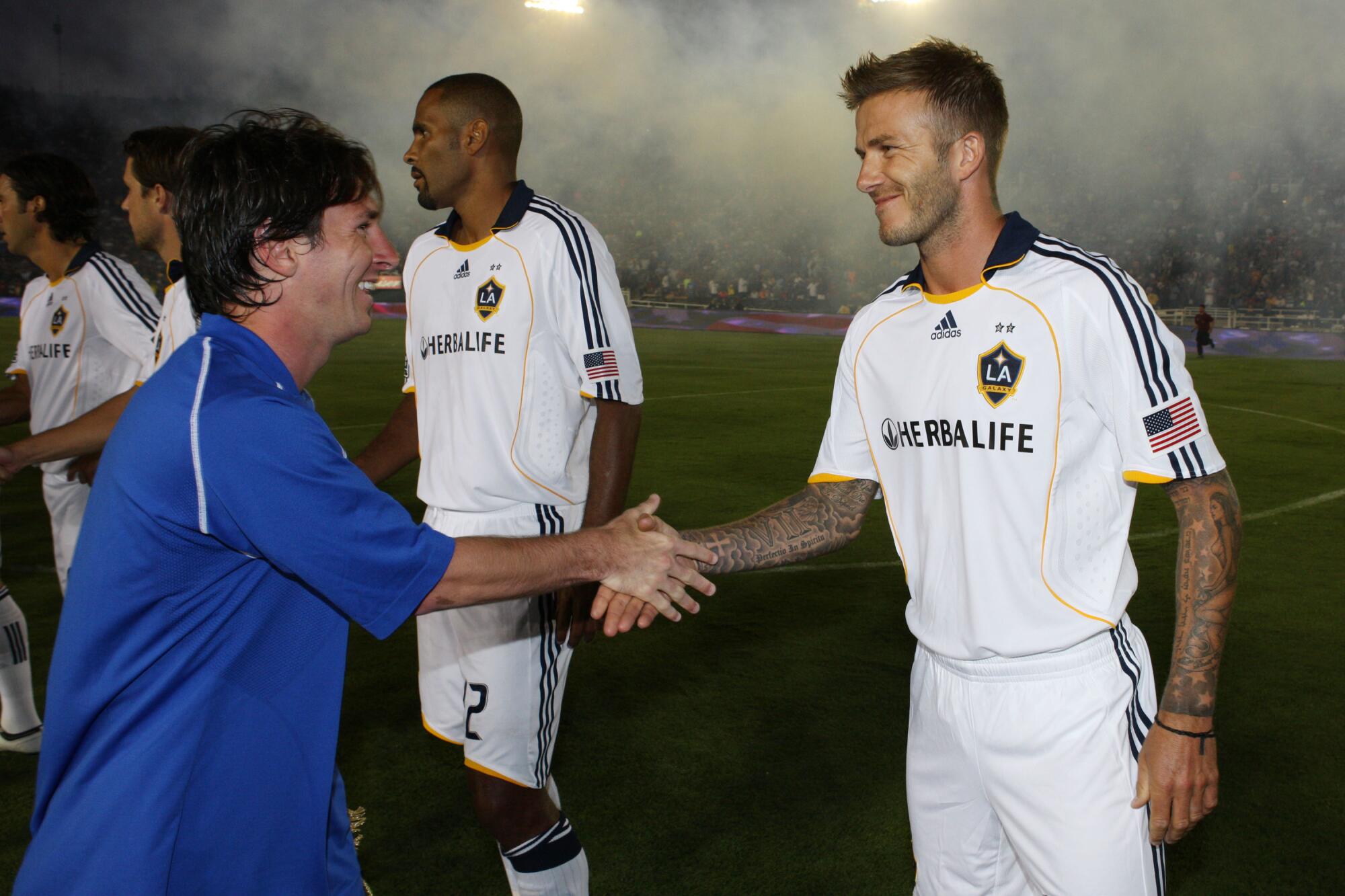
Trace the timeline of Major League Soccer from its uncertain beginnings to its unquestioned success and you’ll find Greg Vanney was there at every important juncture.
He played in 29 games, including the first MLS Cup final, in the league’s inaugural season in 1996, then came off the bench in David Beckham’s debut 11 years later. In 2017, he took Toronto FC to three trophies, still the only MLS treble, and last season he coached the Galaxy in front of a Rose Bowl crowd of 82,110, largest in the league’s history.
But if that’s the league’s past and present, on Sunday Vanney will enter the future, where a league that has long thrived on star power has reached a new level thanks to a player whose mere presence has come to dominate it.
The “M” in MLS stands for Messi.
Lionel Messi, arguably the greatest player in soccer history, joined MLS and Inter Miami last summer but played only six league games. That, however, was enough to change everything. Ticket sales and revenue soared; subscriptions to Apple TV, the league’s broadcast partner, more than doubled; and Vogue magazine put Messi’s Barbie-pink Inter Miami jersey on its list of the 15 fashion items that defined 2023.
So just imagine what Messi can accomplish in a full season, something he’ll get this year. Inter Miami opened the season last Wednesday, with Messi playing all 90 minutes and picking up an assist in a 2-0 win over Real Salt Lake, and will face Vanney’s Galaxy on Sunday in front of a sellout crowd in what club president Tom Braun said would be the highest-grossing game in the history of Dignity Health Sports Park.
The Galaxy will try to upset Lionel Messi and Inter Miami to open a season that could determine the fate of coach Greg Vanney and several others.
And many in that crowd will be focused on one player.
“The greatest player of all time is now in our league. And it’s pretty exciting,” Vanney said. “We’ve really entered the global market of the sport.
“It drives more attention to our league. People will watch and they’ll understand that the league has a higher level than maybe they perceived. It just continues to help the league grow.”
MLS has been here before. In 2007, the league was a sleepy soccer backwater with few teams, fewer fans and players who weren’t necessarily household names in their own households. Then the Galaxy signed Real Madrid midfielder David Beckham, a former Champions League winner who was married to a pop star and appeared more often in People magazine than he did in Sports Illustrated.
Soccer fandom in the U.S. went from geek to chic.
“With the arrival of David and then the eyeballs that came on the league, the sport started to become a business,” Vanney said. “It started to transform and cross different avenues.”
MLS more than doubled in size post-Beckham and average attendance increased by nearly 40%, which explains why the Galaxy erected a larger-than-life bronze statue of Beckham in front of their stadium. The league, meanwhile, gave him the rights to an MLS expansion team, a contract clause he invoked in 2018 to launch Inter Miami for $25 million.
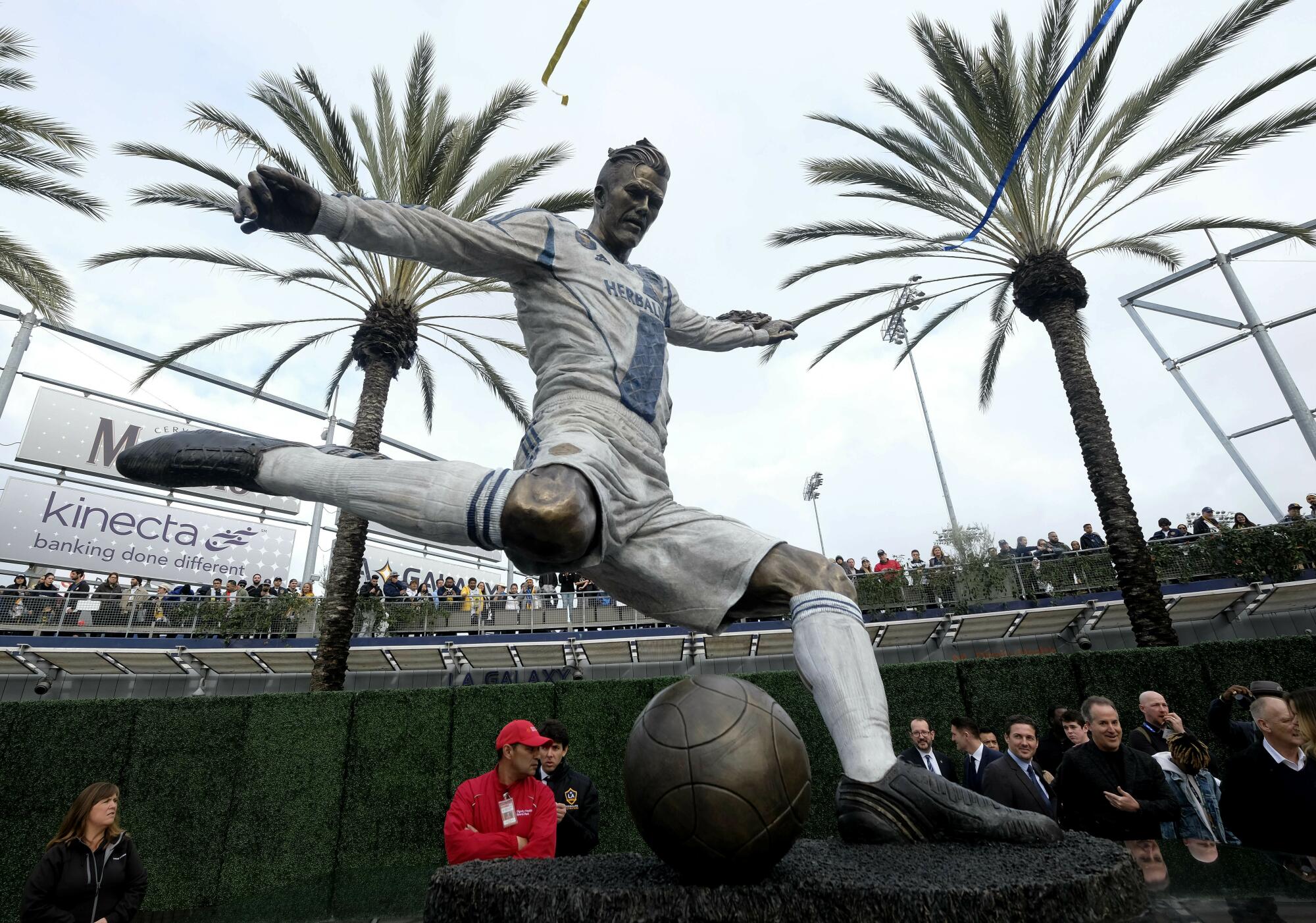
Five years later, he signed Messi and the team is now valued at more than $1 billion.
But if Beckham the player brought the league attention and respectability, Beckham the owner brought the league Messi and ... well, everything else.
“As good as David was as a player, we’re talking about a whole other level when it comes to Messi,” said Alexi Lalas, a two-time World Cup player who was the Galaxy’s president when they signed Beckham. “This is a very different level of credibility. Arguably the greatest player ever to play the game.”
And that has proved to be a marketable asset.
When Inter Miami opened the new season, it was playing at Chase Stadium, the arena’s name purchased for the remainder of Messi’s contract by JPMorgan Chase, and wearing pink jerseys with Royal Caribbean’s logo on the front. What Chase paid for the naming rights is unknown, but the jersey sponsorship is worth approximately $22 million a season, a league record and nearly four times the previous high.
The team’s six-game 23,000-mile winter tour — which took Messi and Co. to Texas, El Salvador, Hong Kong, Saudi Arabia and Japan — generated millions more with Paul Tenorio of the Athletic reporting the games earned the MLS team more than Manchester United, Real Madrid and Barcelona generate on their preseason tours.
The sports-business website Sportico has valued the franchise at just more than $1 billion — only LAFC and Atlanta United, both former league champions, are worth more — and Xavier Asensi, the team’s chief business officer, said Inter Miami was projecting revenues of more than $200 million this season, about four times what it made in 2022, the season before Messi arrived.
Lionel Messi and Inter Miami could meet LAFC in the Leagues Cup final, but soccer’s most electrifying player might be causing a radical shift in MLS.
But the impact of Messi Mania is being felt leaguewide as well. The Sports Business Journal said Apple’s MLS Season Pass surpassed 2 million subscribers by the end of the 2023 season, more than doubling after Messi’s July arrival and taking the league to a truly global audience for the first time. And Michelle Kaufman of the Miami Herald wrote this month that Inter Miami has become the most popular team on StubHub, where prices on the secondary market are 150 times higher than at this point last year and seven times higher throughout MLS.
“We had the Beckham experiment. So this is the Messi experiment,” Lalas said. “It was incredibly positive and impactful last year.”
The change to MLS in only seven months has been so profound, Asensi likens Messi’s influence on the league not to Beckham, his boss, but to Michael Jordan, who made the NBA a global brand.
“The arenas were not full pre-Michael Jordan. That has changed completely,” he said. “It’s like Tiger Woods in golf or Usain Bolt in track and field, Michael Phelps in swimming. He’s the greatest of all time in the biggest sport worldwide in terms of viewership.
“It’s an opportunity we have to seize.”
None of those athletes changed their sports on their own though, and the transformation Messi wrought in MLS has actually been years in the making. It was Beckham’s arrival that first lifted the profile of MLS, making it safe for players such as Thierry Henry, Robbie Keane, Wayne Rooney, Steven Gerrard, Frank Lampard, Zlatan Ibrahimovic, Gareth Bale and Giorgio Chiellini to follow.
Now comes Messi, an eight-time world player of the year fresh off his first World Cup title.
“The Messi effect is dramatic,” MLS commissioner Don Garber said. “There’s really one Messi. His signing was a statement about Major League Soccer. It was about how we can compete and that we can deliver a great experience for a player and a competitive environment where they can further their career.
“There will be another player that will come in, maybe will be part of the chapter book of our league. But there’s only one Leo, and there won’t probably be another Leo. I’m glad that he’s at Major League Soccer.”
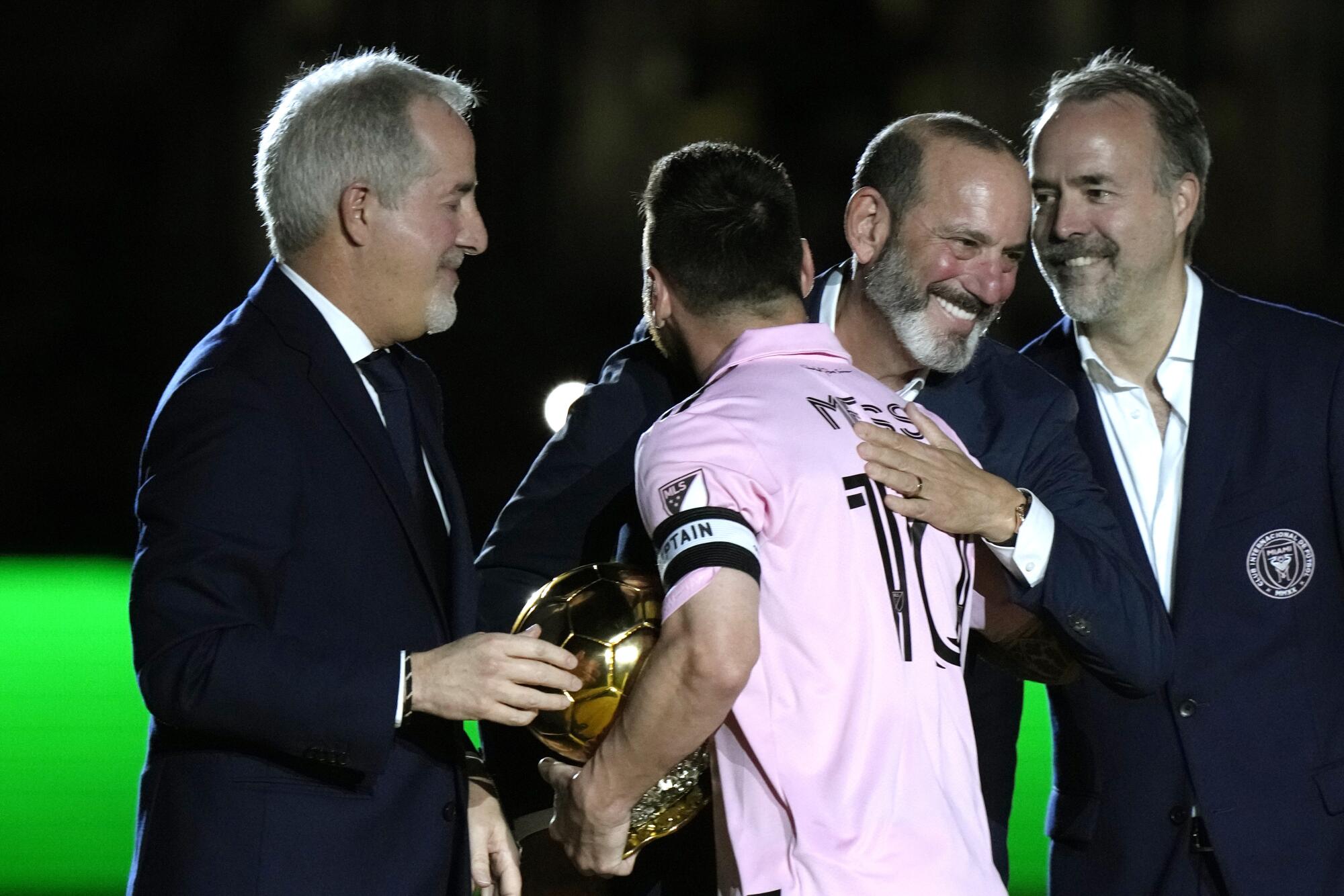
Messi isn’t the only Champions League winner Beckham and Jorge Mas — the team’s hyper-aggressive managing owner — have attracted to Miami. Former Barcelona teammates Sergio Busquets, a World Cup winner in 2010 with Spain, and Jordi Alba also signed with the team last summer, and Luis Suárez of Uruguay joined in December.
Before Wednesday, no MLS team had ever fielded a team with four Champions League winners and two World Cup champions.
It has been an expensive investment, however, and MLS, which operates under a salary cap, will have to evolve to maintain the momentum. Messi’s designated-player contract, which counts only partially against the cap, was worth a guaranteed $20.45 million last season — not including side deals with Apple and Adidas that could more than double his salary. That accounted for than more than half of Inter Miami’s league-record payroll of $39.4 million. And with Alba and Busquets earning another $3 million-plus combined, the team had trouble squeezing Suárez, whose salary remains unknown, under the cap.
The team also had to transfer midfielder Gregore, its former captain, to Brazilian club Botafogo and buy out the contract of French attacker Corentin Jean to become roster compliant for the start of the MLS season. For Lalas, that’s punishing Mas for investing in his team and the league.
“At some point it becomes a problem,” he said. “I don’t know why we consistently squash people that have vision, people that want to spend money, and in doing so not only make their own asset more valuable, but everyone else’s more valuable.
“If there was ever a time to do something big and bold, if there was ever a time to actually let these teams that want to do big bold things, permit them to do it through the rules and regulations. … [MLS] has grown to a point now where it can handle much more open type of spending.”
Garber, however, appears content to spike the soccer ball, celebrating the present rather than seizing the future.
“We’ve created a new model in signing the biggest and the most successful player in the world, and the rest of the world is watching how this all plays out,” the commissioner said. “I give enormous credit to Jorge Mas and David Beckham for working for many years — almost from the time that they bought the team — to put a stake in the ground and say that Inter Miami has aspirations to be a global team with the biggest names in the world.”
The Galaxy’s decision to pursue David Beckham — and the English soccer star’s decision to sign with them — marked a turning point for the MLS.
What Inter Messi ... eh, Inter Miami ... hasn’t done yet is win. At least not in MLS.
Although the team was unbeaten in the inaugural Leagues Cup, beating Nashville SC in the final on penalty kicks, and made it to the final of the final of the U.S. Open Cup before losing, without Messi, to the Houston Dynamo, Inter Miami has yet to make the playoffs — or even post a winning record — in MLS play.
And while Messi scored 10 times in seven Leagues Cup games last summer, he has only one MLS goal in seven MLS appearances over two seasons.
“It’s a small sample size, but it was incredibly positive and impactful last year. Now we’re going to see what it really looks like,” Lalas said. “It’s kind of a double-edged sword. Because they have Messi, there’s extra expectations that other clubs don’t have. People are going to buy tickets and they’re going to make a lot of money.
“Ultimately the measure of success is the changing of the mindset. What I hope plays out is that in the next few years we start to see players who are not just kicking the tires but actually want to come. I live for the day when somebody says, ‘Well, Messi did. If it’s good enough for Messi, it’s certainly good enough for me.’”

